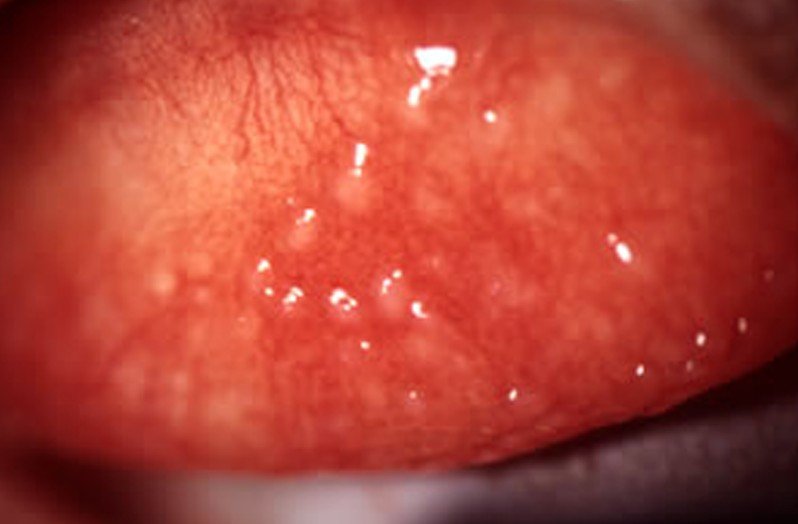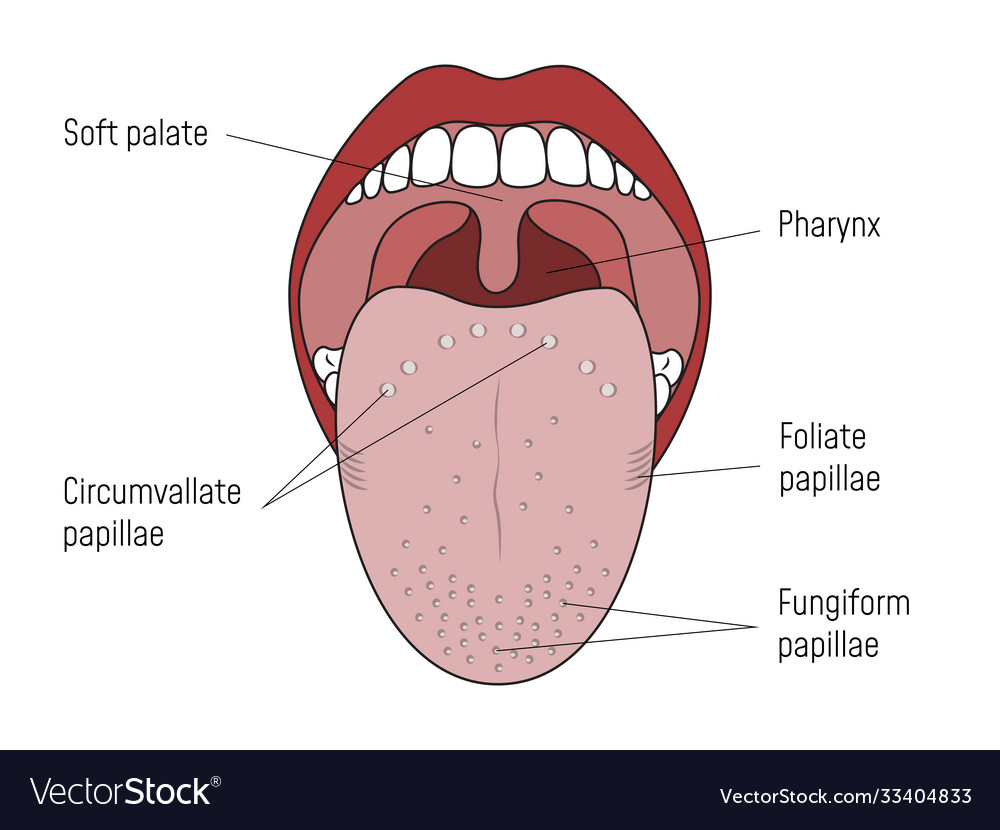So here's the deal, if you've ever felt like there's something off about your tongue—like it's bumpy, swollen, or just plain weird—hypertrophy papillae might be the reason. This condition sounds fancy, but it's actually more common than you think. Let's dive right into it and figure out what’s going on with your tongue, shall we? You’re not alone in this, and we’re about to break it down for you in a way that’s super easy to understand.
Now, before we get into the nitty-gritty, let's talk about why this matters. Hypertrophy papillae isn't just a random medical term; it can significantly affect how you feel day-to-day. Imagine waking up with a sore tongue or noticing weird bumps that weren't there before. It’s kinda unsettling, right? But don’t worry, we’ve got your back. In this article, we’ll cover everything from what hypertrophy papillae is to how you can manage it.
And guess what? We’re not just throwing random info at you. This article is packed with expert insights, practical tips, and even some fun facts about your tongue. So whether you’re here because of a weird bump or just plain curiosity, you’re in the right place. Let’s get started!
Read also:Ayatanjali Nudes Unveiling The Truth Behind The Controversy
What Exactly is Hypertrophy Papillae?
Hypertrophy papillae, in simple terms, refers to the enlargement of the papillae on your tongue. Think of the papillae as those tiny bumps that cover your tongue—they’re responsible for your sense of taste and texture. When these little guys grow larger than usual, it can cause discomfort, irritation, or even pain. And no, it’s not always a sign of something serious, but it’s definitely worth paying attention to.
Now, here’s the kicker: hypertrophy papillae can happen for a bunch of reasons. Stress, infections, nutritional deficiencies, or even certain medications can trigger this condition. So if you’ve been feeling off lately, it might be worth checking out what’s going on with your tongue. Trust me, it’s not as scary as it sounds.
How Common is Hypertrophy Papillae?
According to studies, hypertrophy papillae isn’t rare, but it’s also not something most people talk about. A survey conducted by the American Dental Association found that up to 10% of adults experience some form of tongue irritation or abnormality at some point in their lives. Crazy, right? So if you’re dealing with this, you’re definitely not alone.
Causes of Hypertrophy Papillae
Alright, let’s break it down. What exactly causes these little bumps to go rogue? There are several factors that can contribute to hypertrophy papillae, and understanding them can help you figure out the root cause of your discomfort. Here’s a quick rundown:
- Infections: Bacterial or viral infections can irritate the tongue and cause the papillae to swell.
- Trauma: Biting your tongue, burning it on hot food, or even brushing too hard can lead to hypertrophy papillae.
- Nutritional Deficiencies: Lack of essential vitamins and minerals, like B12 or iron, can affect the health of your tongue.
- Allergies: Some people are allergic to certain foods or dental products, which can trigger an inflammatory response in the mouth.
So, if you’ve been indulging in spicy food or using a new toothpaste and suddenly notice weird bumps on your tongue, it might be time to reassess your habits.
Can Stress Cause Hypertrophy Papillae?
Oh, absolutely. Stress has a way of manifesting itself in unexpected ways, and your tongue is no exception. When you’re stressed, your body produces more cortisol, which can weaken your immune system and make you more susceptible to infections or inflammation. So if you’ve been under a lot of pressure lately, it might be worth considering how that’s affecting your oral health.
Read also:Jake Ream Rising Star Of The Digital Era
Recognizing the Symptoms
Now that we’ve covered the causes, let’s talk about how to spot hypertrophy papillae. The symptoms can vary from person to person, but here are some common signs to look out for:
- Bumpy or uneven texture on the tongue
- Swelling or enlargement of the papillae
- Pain or tenderness when eating or speaking
- Changes in taste perception
- Redness or irritation in the affected area
If any of these sound familiar, it’s probably a good idea to consult a dentist or doctor. They can help you determine the underlying cause and recommend the best course of action.
Is Hypertrophy Papillae Painful?
Not always, but it can be. Some people experience mild discomfort, while others report more intense pain. It really depends on the severity of the condition and the underlying cause. If you’re dealing with persistent pain or discomfort, don’t hesitate to seek professional help. Your tongue deserves some TLC, after all.
Diagnosing Hypertrophy Papillae
So, how do doctors figure out if you’ve got hypertrophy papillae? It usually starts with a physical examination of your tongue. They’ll look for signs of swelling, redness, or abnormal growths. In some cases, they might also take a biopsy or run blood tests to rule out other potential causes.
Now, here’s the good news: diagnosing hypertrophy papillae isn’t as complicated as it sounds. Most of the time, a simple visual inspection is enough to identify the issue. But if your doctor suspects something more serious, they’ll explore further testing options. It’s all about getting to the bottom of what’s causing your symptoms.
What Tests are Commonly Used?
While a physical exam is usually sufficient, there are a few tests that doctors might use to confirm a diagnosis:
- Biopsy: A small sample of tissue is taken from the affected area for further analysis.
- Blood Tests: These can help identify nutritional deficiencies or underlying health conditions.
- Imaging Tests: In rare cases, an X-ray or MRI might be used to get a better look at the tongue and surrounding structures.
Again, these tests aren’t always necessary, but they can provide valuable insights if your symptoms are persistent or severe.
Treatment Options for Hypertrophy Papillae
Okay, so you’ve got a diagnosis—now what? The good news is that hypertrophy papillae is usually treatable, especially if the underlying cause is addressed. Here are some common treatment options:
- Antibiotics: If an infection is to blame, your doctor might prescribe antibiotics to clear it up.
- Topical Treatments: Anti-inflammatory creams or mouthwashes can help reduce swelling and irritation.
- Nutritional Supplements: If a deficiency is causing the problem, taking supplements like B12 or iron might help.
- Lifestyle Changes: Cutting back on spicy foods, quitting smoking, or managing stress can all make a difference.
And remember, treatment isn’t a one-size-fits-all solution. What works for one person might not work for another, so it’s important to work closely with your healthcare provider to find the best approach for you.
Can Hypertrophy Papillae Go Away on Its Own?
In some cases, yes. Mild cases of hypertrophy papillae might resolve on their own without any intervention. But if the condition persists or worsens, it’s definitely worth seeking medical attention. Your tongue is a vital part of your body, and taking care of it should be a priority.
Preventing Hypertrophy Papillae
Prevention is always better than cure, right? Here are a few tips to help you keep your tongue healthy and avoid hypertrophy papillae:
- Maintain good oral hygiene by brushing and flossing regularly.
- Avoid spicy, acidic, or overly hot foods that can irritate your tongue.
- Stay hydrated and eat a balanced diet rich in essential nutrients.
- Manage stress through exercise, meditation, or other relaxation techniques.
By taking these simple steps, you can significantly reduce your risk of developing hypertrophy papillae. And let’s be honest, who doesn’t want a happy, healthy tongue?
Is Hypertrophy Papillae Preventable?
While some cases might be unavoidable, many instances of hypertrophy papillae can be prevented with proper care and attention. By addressing potential triggers like stress, nutritional deficiencies, or poor oral hygiene, you can keep your tongue in top shape. It’s all about being proactive and staying informed.
Living with Hypertrophy Papillae
So, what’s life like with hypertrophy papillae? For some people, it’s a minor inconvenience that comes and goes. For others, it can be a persistent issue that affects their daily lives. The key is learning how to manage the condition and minimize its impact on your overall well-being.
Here are a few strategies to help you live comfortably with hypertrophy papillae:
- Stay in touch with your healthcare provider for regular check-ups.
- Keep a journal of your symptoms to identify potential triggers.
- Experiment with different treatments to find what works best for you.
Remember, you’re not alone in this. Millions of people deal with similar issues, and there’s a whole community of experts and resources ready to support you.
Can Hypertrophy Papillae Affect Your Quality of Life?
Absolutely. If left untreated, hypertrophy papillae can lead to chronic discomfort, difficulty eating, or even anxiety about your appearance. But with the right care and management, you can keep these effects to a minimum. It’s all about finding what works for you and sticking to a routine that promotes healing and wellness.
Conclusion: Taking Control of Your Oral Health
So there you have it—a comprehensive guide to hypertrophy papillae. From understanding the causes and symptoms to exploring treatment options and prevention strategies, we’ve covered everything you need to know about this condition. Remember, your oral health is just as important as your overall health, so don’t hesitate to seek help if you’re experiencing any issues.
And here’s the best part: by staying informed and proactive, you can take control of your health and prevent many of these problems from occurring in the first place. So go ahead, take a deep breath, and give your tongue the love and attention it deserves. You’ve got this!
Before you go, don’t forget to leave a comment or share this article with someone who might find it helpful. And if you’re looking for more tips on maintaining a healthy lifestyle, be sure to check out our other articles. We’re here to help you live your best life, one step at a time!
Table of Contents
- What Exactly is Hypertrophy Papillae?
- Causes of Hypertrophy Papillae
- Recognizing the Symptoms
- Diagnosing Hypertrophy Papillae
- Treatment Options for Hypertrophy Papillae
- Preventing Hypertrophy Papillae
- Living with Hypertrophy Papillae
- Can Stress Cause Hypertrophy Papillae?
- Is Hypertrophy Papillae Painful?
- Is Hypertrophy Papillae Preventable?

